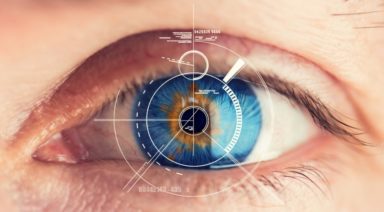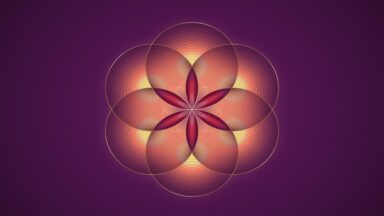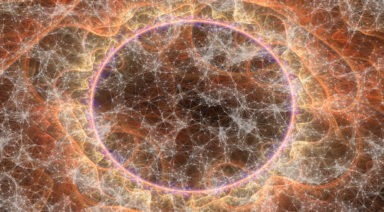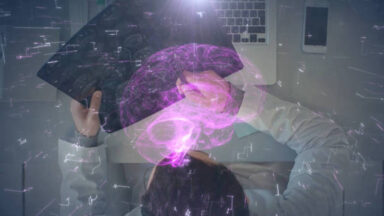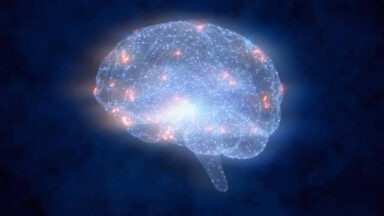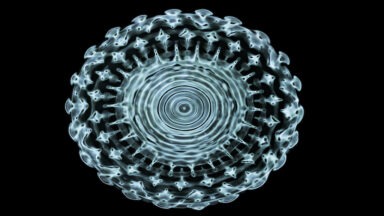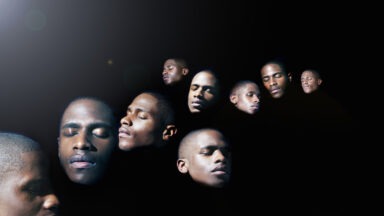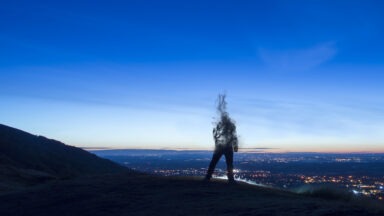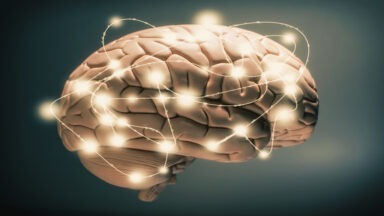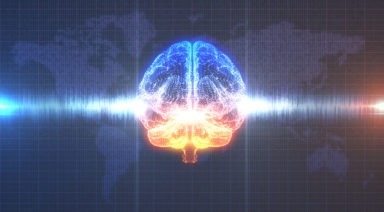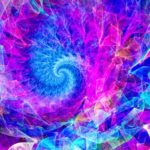Scientist Explains What Happens When People Channel

When you hear the word channeling, what comes to mind? Many of us would think of Bashar, Seth, Barbara Marciniak, Edgar Cayce, etc. In other words, most people think of trance channeling, where a person allows a supposed entity (deceased spirits, aliens, angels, higher self, etc.) to use their body as a vehicle to communicate.
I am a trained clinician, naturopathic physician, and Director of Research at the Institute of Noetic Sciences. I also happen to come from a long line of trance channelers and received a BIAL grant for researching the physiological effects of full-trance channeling:
As someone who bridges the worlds of scientific inquiry and the esoteric, I have a more encompassing definition for channeling:
“Channeling is the process of revealing information and energy not limited by our conventional notions of space and time that can appear receptive or expressive.” – from The Science of Channeling
One of the most confusing things about channeling is its name. Many people associate it with trance channeling. Others use it interchangeably with terms like psychic, medium, psi, ESP, etc. When I first engaged in conversation with people about these phenomena, I found that the terms meant different things to different people.
For example, as a naïve new researcher in the field, I formally reviewed the literature to understand the terms used for trance channeling. There were 29 different terms used to describe this form of channeling and the people who do it.
Multiple research studies show that channeling is experienced on a spectrum. On one side, you have widespread experiences like intuition and gut hunches. Telepathy, clairvoyance, and precognition lie somewhere in the middle. Rarer experiences like trance channeling and out-of-body experiences are on the far side of the spectrum. Channeling comes in so many forms.
At IONS, we call your unique way of channeling your Noetic Signature™. There is no right or wrong signature. All are beautiful and unique. Just as each snowflake is different yet equal in its exquisite beauty, each person’s Noetic Signature™ has inherent value.
An Overview of Channeling
In my book, The Science of Channeling: Why You Should Trust Your Intuition and Embrace the Force That Connects Us All, I share about the IONS Channeling Research Program and what we’ve learned by investigating these research questions:
- How common is channeling, and what are its characteristics?
- How does channeling work?
- Are there defining characteristics of someone who channels easily?
- Can we verify the information?
- Is the content useful?
In this blog post, I’d like to share an overview of these findings with you. You can also watch a video about some of our findings here.
How Common Is Channeling?
Not only are channeling abilities found in perfectly healthy people, but the experience of channeling is actually quite common.
In another study conducted by IONS, we surveyed scientists, engineers, the general public, and IONS members about their channeling experiences. We were surprised to find that of the 900 participants, a whopping 90% (93-99%) had at least one channeling experience in their lifetime.
This suggests that channeling experiences are common. In fact, Rapoport, Leiby-Clark, and Czyzewicz put out a survey each year to gather information on the number of Americans that believe in paranormal phenomena. What’s interesting is that this number has increased year over year.
One overarching theme in parapsychological research is that the more we believe in phenomena, the more likely we are to experience them. This could account for that growing number. That being said, some channeling experiences are more common than others.
I think of channeling as being like a spectrum. On the subtler side, people experience clairempathy, claircognizance, lucid dreaming, and telepathy. Somewhere toward the middle are precognition and mediumship. And at the far end of the spectrum are rarer experiences like trance channeling, geomancy, psychic healing, pyrokinesis, and levitation.
Is Channeled Information Real?
Channeling may be common — but is it real? “Real” would mean that channeling can be observed with objective measures rather than just anecdotal accounts.
Jessica Utts published an interesting statistic in a study featured in the Journal of Scientific Exploration. She showed us that the effects observed in ESP research are significantly larger than the effect size of 81 mg of aspirin therapy.
In other words: Many channeling phenomena appear to be very real.
Some evidence for channeling can be found in the work of Rupert Sheldrake. Sheldrake has compiled a database of 4,000 case histories, 2,000 questionnaires, 1,500 interviews, and more than a decade of controlled experiments — all of which indicate that consciousness is nonlocal and fundamental. He and many other scientists have conducted direct mental interactions with living systems (DMILS) experiments that show us a person (the sender) can remotely influence another person’s (the receiver’s) physiology.
In these studies, a sender directs positive intention toward the receiver. Both participants’ bodies are measured for physiological changes. The results are consistent: Small but significant effects can be observed in the physiology of the receiver. DMILS is probably why, for example, we can sense when someone is staring at us.
And yet the evidence for channeled information goes beyond any individual study. In the scientific world, a meta-analysis is the pinnacle of proof. A meta-analysis looks at general trends across many studies and yields an integrated result. These types of analyses are critical because they give a more precise estimate of effect size and may give us conclusive results where individual studies cannot.
Meta-analyses related to channeling illustrate that the evidence for psychic experiences are comparable to that of established phenomena in psychology.
So yes, we have good reason to believe that channeling is real. Which leads us to yet another question: How does channeling work?
How Does Channeling Work?
At this point, no one is sure exactly how channeling works. We understand bits and pieces but more research is needed.
Relative to other branches of science, psi research is notably lacking. On the one hand, this is exciting: Psi is a relatively untapped frontier. On the other hand, the field is underfunded. Additionally, these topics remain taboo in the scientific community.
With little funding (and the genuine possibility of staking one’s career), few scientists are willing to commit their time and energy to psi research (even though, behind the scenes, many are interested in this field!).
In any case, we are in the infancy of our understanding of extended human capacities. Right now, we just have ideas.
It appears as though channeling transcends time and space because the effects of psychic phenomena are instantaneous. For example, in Random Number Generator (RNG) studies, a generator produces random numbers. And yet, when a person directs their attention to the generator, the numbers become less random.
How is something like this possible?
All of parapsychology hinges on the idea that consciousness is nonlocal and fundamental; therefore, everything is interconnected. It’s as though we can all tap into a consciousness larger than the one we experience in our day-to-day life.
It also appears that our abilities to tap into this consciousness are limited by external stimuli. This is why meditation is often used to cultivate intuitive abilities: It’s about learning how to shut out the noise.
Where Does Channeled Information Come From?
We don’t understand all the mechanics of channeling yet…and we’re not sure where the information is coming from. We conducted a survey among channelers where participants were asked what they thought the source of their channeled information was. They were able to choose as many options as they wanted:
56% of participants thought the source of channeling was their higher self;
50% said the universal mind;
47% said the unconscious mind.
Fewer people reported channeling spirits, ETs, deities, or other entities.
Common Traits of Spiritual Channels
In our research, we have found that certain characteristics lend themselves to channeling.
First of all, believing that you can channel predicts that you will have more channeling experiences and do better on laboratory tests. In studies done in the West, women report stronger and more frequent experiences than men. This may be because women tend to carry more yin qualities. Yin is feminine energy. It is open, receptive, and connected. In these western studies, channelers also tend to describe themselves as “spiritual but not religious.” Other demographic information, such as age and race, have mixed results.
That being said, we believe that everyone can learn to channel.
What is your unique way of channeling? If you’re interested in discovering or further cultivating your channeling abilities, you can order a copy of The Science of Channeling. In it, I’ll show you how to identify and hone your own channeling skills, process the information you receive, and use your unique gift to improve your life — and the world around you.
Precognition: Is It Possible to Know Something Before It Happens?

Precognition is the ability to know that something is going to happen before it occurs. It is a form of perception that does not depend on visible signs, sounds, or other environmental cues. In this article, we explore what precognition is, how it manifests, and what you can do to develop this ability.
Table of Contents
- What Is Precognition?
- How Is Precognitive Information Received?
- Differences Between Precognition, Intuition, and Clairvoyance
- Precognition and Spiritual Channeling: Is There a Connection?
- Spontaneous and Induced Precognition: Two Ways It Manifests
- Can Anyone Develop Precognition?
- How to Develop the Ability of Precognition
- How to Integrate Precognition Into Daily Life
What Is Precognition?
Precognition is defined as the anticipatory perception of an event that has not yet happened. Unlike other psychic phenomena, precognition implies a direct connection with future time, without the need for prior signals or logical deductions. Those who experience this ability often report visions, sensations, or dreams that later manifest in reality.
This ability can manifest sporadically or repeatedly, and it’s not always easy to recognize immediately. In many cases, a person may not realize they have had a precognitive experience until the predicted event actually occurs. That’s why learning to identify the patterns and sensations associated with this type of perception is key to developing it.
Although precognition is commonly associated with prophetic dreams, it can also appear during waking states, meditation, or moments of deep emotional connection. It is not about fortune-telling, but rather a subtle form of access to information that transcends ordinary perception of time.
How Is Precognitive Information Received?
Precognitive information can arrive in many ways, depending on a person’s sensitivity and the context in which it manifests. Here are some of the most common forms:
- Precognitive dreams: These often appear as vivid or symbolic dreams that anticipate future events. Although they may seem confusing at the time, their meaning becomes clear when the predicted event takes place.
- Spontaneous images or visions: These manifest as brief, spontaneous mental scenes that arise without apparent cause. They are usually accompanied by a strong emotional charge or a sense of certainty.
- Physical or emotional sensations: Some people feel physical discomfort or intense emotions without a clear reason, just before something important happens. Over time, they learn to recognize these sensations as warnings of what is about to occur.
- Words, thoughts, or “instant knowledge”: These are sudden perceptions of information, as if one “just knew” something without learning it. This form of precognition tends to be clear and direct, without ambiguity.

Differences Between Precognition, Intuition, and Clairvoyance
Although precognition, intuition, and clairvoyance may seem similar, each functions in a distinct way. Precognition is specifically related to the perception of future events. Intuition, on the other hand, is an immediate understanding or a sense about something that is happening or about to happen, without necessarily containing precise information about the future. Intuition tends to be broader and less detailed.
Clairvoyance, meanwhile, is the ability to “see” information beyond the physical—whether from the past, present, or future. A clairvoyant person may receive mental images, symbols, or scenes representing a situation. While clairvoyance can include precognitive moments, not all clairvoyant experiences are anticipations of the future. The main difference lies in the type of perception and the time frame to which the information refers.
Precognition and Spiritual Channeling: Is There a Connection?
Precognition and spiritual channeling share a common foundation: access to information that does not come from rational analysis. In both cases, the person acts as a receiver of knowledge that seems to arise from a deeper or higher source. Although not every precognitive experience involves spiritual contact, the messages perceived often carry a sense of clarity, symbolism, or emotional depth that suggests a link with subtle planes of consciousness.
In the series Channeling: A Bridge to the Beyond, available on Gaia, various ways are explored in which channelers access non-physical information—including precognitive experiences. Through interviews with experts and renowned channelers, the series shows how our perception of time can expand when connecting with guides, energies, or dimensions beyond the visible.
Spontaneous and Induced Precognition: Two Ways It Manifests
Precognition can manifest in different ways, either spontaneously or through intentional practices. In some cases, it appears without warning, as a dream, a sudden image, or an intense sensation that anticipates something to come. These experiences often occur during moments of relaxation, when the mind is more open. But they can also be consciously activated through techniques like meditation or psychic exercises designed to deliberately access future information.
Both spontaneous and induced forms share the same origin: access to data that has not yet materialized in physical reality. The difference lies in the level of control and preparation. While one arises unexpectedly, the other requires training and focus. Both are valid and complementary paths in developing this ability.
Can Anyone Develop Precognition?
Yes, anyone can develop precognition, although the process may vary from person to person. Some individuals are born with a naturally heightened sensitivity, but that doesn’t mean it’s an exclusive ability. With practice, focus, and an open mind, it’s possible to activate and strengthen this skill over time.
The most important thing is to cultivate mindfulness and learn to recognize internal signals. Precognition usually doesn’t appear in dramatic ways at first—it often begins with subtle cues that become clearer with practice. Learning to recognize when your perception is activated, recording your experiences, and trusting what you perceive are key steps in its development.
How to Develop the Ability of Precognition
Developing precognition requires consistency, sensitivity, and openness to new ways of perception. These practices can help you gradually train this ability:
- Keep a perception journal: Write down dreams, intuitions, or spontaneous images. Reviewing these records allows you to detect patterns and confirm synchronicities.
- Practice meditation regularly: Meditation silences mental noise and increases receptivity. It’s essential for accessing subtle information.
- Observe your emotions and sensations: Pay attention to sudden changes in your emotional or physical state. These are often anticipatory signals that tend to repeat.
- Ask questions before sleeping: Formulate a clear question and see if you receive any revealing dreams. This exercise activates the precognitive channel during rest.
- Trust what you perceive: Doubt blocks the flow of information. Practicing confidence in your impressions is essential to strengthen this ability.
How to Integrate Precognition Into Daily Life
Incorporating precognition into your daily life doesn’t mean constantly waiting for signs—it means learning to recognize when your perception is activated. You can start by paying more attention to your intuition when making decisions or when you feel an internal warning you can’t explain. The more you listen and validate it, the more natural it becomes.
It’s also helpful to create brief moments of silence or reflection during the day. This makes it easier to connect with your inner perception, even amid routine. Precognition becomes a practical tool when you stop forcing answers and allow information to arrive in a spontaneous and fluid way.






